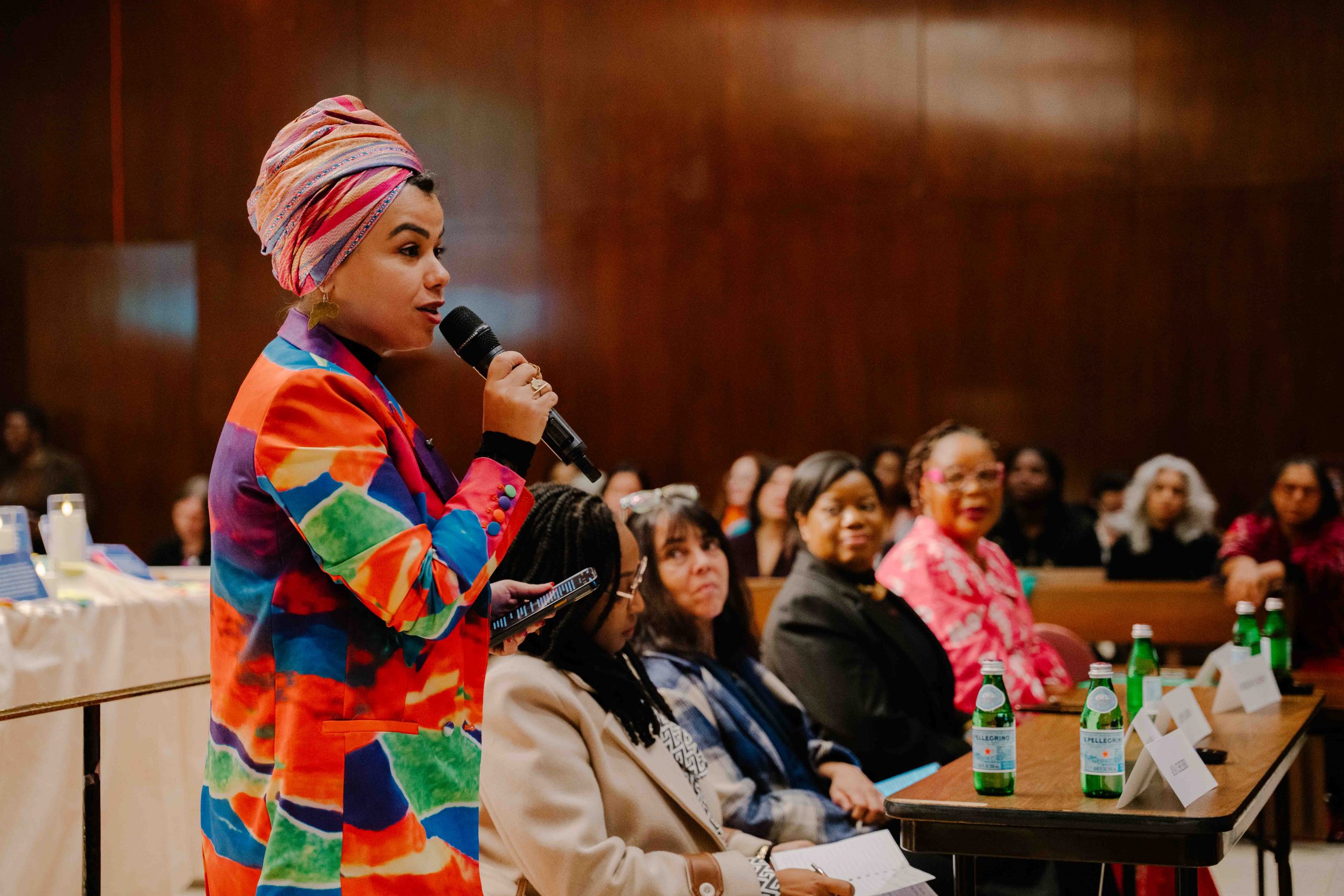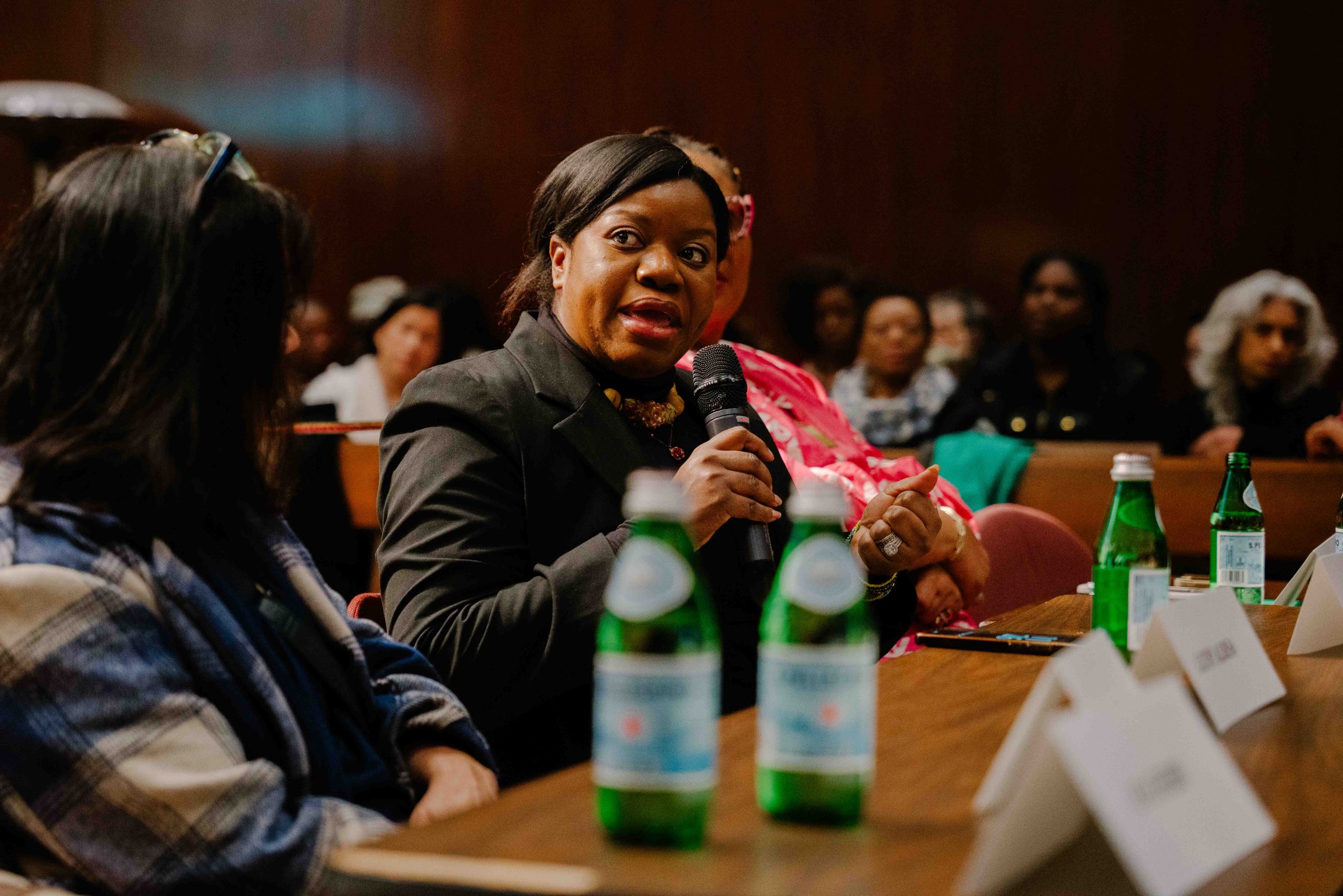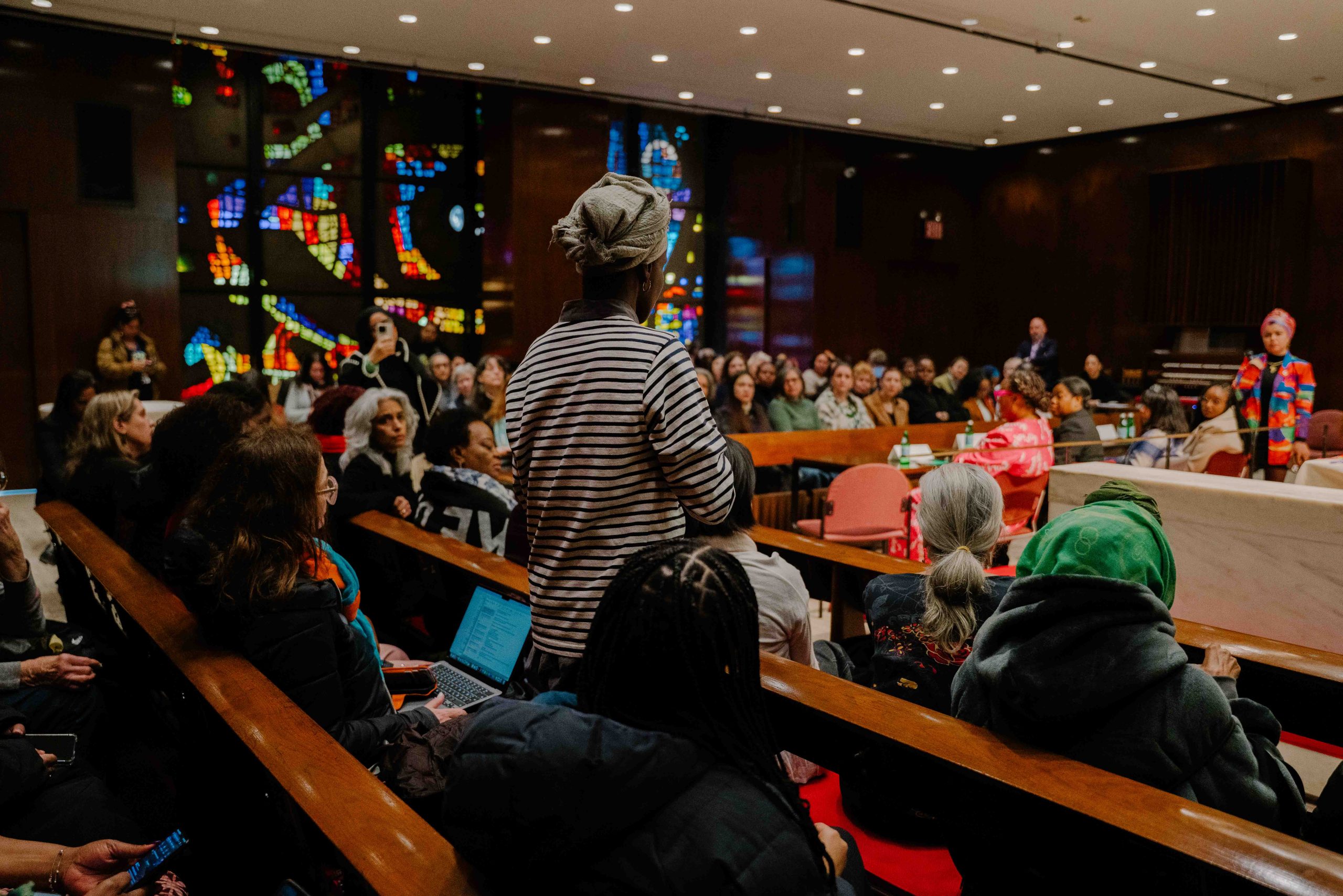The Institute brought together movement leaders, policymakers, and advocates at the UN Commission on the Status of Women to discuss strategies and struggles for organizers globally.

Ms. Aya Chebbi moderates the Institute’s CSW side event, Stories from the Frontlines: Strategies and Struggles Across Movement-Based Organizing.
Photo Credit: Milik Robinson, CUNY School of Law
Three decades since the historic 1995 Beijing World Conference on Women, in this political moment, what are the pressing lessons from front-line and community organizers? This question drove conversation at the Institute on Gender, Law, and Transformative Peace’s March 13, 2025 side event at the 69th convening of the United Nations’ Commission on the Status of Women (CSW).
The Institute’s CSW side event, Stories from the Frontlines: Strategies and Struggles Across Movement-Based Organizing, focused on key strategies, tensions, and achievements of intersecting front-line justice movements from those most impacted. Co-sponsored with the Nobel Women’s Initiative, MADRE, and the Haitian Bridge Alliance, the public panel elevated first-hand experiences and human-centric stories that too often are discounted on the world stage — yet are critical for these times.
Over 200 people attended the dynamic discussion featuring movement leaders, policymakers, and advocates exploring strategies at the intersections of pro-democracy movements, climate, and racial and gender justice. The panelists, representing Liberia, Kenya, the United States, and Tunisia, included: Ms. Leymah Gbowee, Nobel Peace Laureate and Institute Executive Director; Ms. Guerline M. Jozef, Founder and Executive Director, Haitian Bridge Alliance; Ms. Cathy Albisa, Vice President of Institutional and Sectoral Change, Race Forward; Ms. Cindy Kobei, Chair and Founder, Tirap Youth Trust; and was moderated by Ms. Aya Chebbi, Founder and President, Nala Feminist Collective.
Institute Managing Director Dr. Mikaela Luttrell-Rowland set the stage for the conversation through her introductory remarks, asking panelists for lessons and insights needed to turn to in this political moment of growing authoritarianism, stark retraction of human rights, and general growth of anti-rights movements. She emphasized the importance of elevating first-hand stories and lessons from the frontlines in multilateral policy spaces. CUNY Law School Dean Sudha Setty echoed this sentiment, and noted how it is not by chance that the Institute is located within a law school that works in service of public interest, justice, and social change.
“We are here to expose the cracks in the system to challenge power, to imagine new alliances, and to ask what we do to ensure the next 30 years belong to us, to justice, to liberation.”
– Aya Chebbi, Nala Feminist Collective
Ms. Chebbi, who is a Pan-African feminist and diplomat who advocated for democracy during Tunisia’s 2010-11 Revolution, then began the conversation. “Thirty years ago, a shift happened in Beijing. Women from every corner of the world, activists, leaders, revolutionaries came together to demand not just policies but power, they crafted the vision of gender [that was] bold, radical and urgent,” Ms. Chebbi remarked. “Today, three decades later we gather not only to celebrate progress but to interrogate power… We are here to expose the cracks in the system, to challenge power, to imagine new alliances, and to ask what we do to ensure the next 30 years belong to us, to justice, to liberation.” She opened the panel by asking whose voices from the frontlines were the panelists bringing with them into the room? Which movements, organizations or groups of people were they carrying into CSW for those in attendance to better understand and know?

Ms. Leymah Gbowee speaks on the March 13 panel at the United Nations.
Photo Credit: Milik Robinson, CUNY School of Law
Ms. Gbowee, who was awarded the 2011 Nobel Peace Prize for her leadership of the Women of Liberia Mass Action for Peace which played a pivotal role in ending the Civil War and now serves as Executive Director of the Institute, began by talking about the young people at the forefront of so many movements in this moment and the importance of supporting such work in this time of global crisis—particularly within peacebuilding movements that are facing cases of internal civil war and violence. She noted the need for intergenerational movement-building in this moment: “The journey I find myself on today is one of mentoring young women, providing resources for them to do their work.” Ms. Gbowee continued her discussion of the importance of investing in and believing in young people in movement spaces. “I look to the young people. I look to all those who believe in me and believe in the work that I did. It is my duty to do the same for young people.”
Ms. Kobei, a lawyer and Indigenous rights activist from the Ogiek community in Kenya, also spoke about intergenerational movement-building. As Chair and Founder of the Tirap Youth Trust, she works to mobilize young Indigenous people to fight climate change. At the panel, she spoke about empowering youth to speak up against the injustices of Indigenous displacement and climate justice.

Ms. Guerline M. Jozef, Founder and Executive Director of the Haitian Bridge Alliance, speaks on the March 13 panel.
Photo Credit: Milik Robinson / CUNY School of Law
The conversation was then brought to the United States by Ms. Albisa, a constitutional and human rights lawyer who works with government institutions with the racial justice organization Race Forward. She remarked, “It’s true we’ve never had a multiracial democracy in this country, but what we do have now is an opportunity to change and to present a united front — globally. We need to rewire institutions for justice.”
Ms. Jozef, another panelist and a leading human rights advocate, spoke about the work of her organization, the Haitian Bridge Alliance, which advocates for fair and humane immigration policies and provides migrants and immigrants with humanitarian, legal, and social services, with a particular focus on Black migrants, the Haitian community, women and girls, LGBTQIA+ individuals, and survivors of torture and other human rights abuses. During the panel, she discussed current attacks on immigrant justice. She had a determined message for the audience: “We have to ensure our existence is an act of resistance.” Speaking of anti-rights politicians, Ms. Jozef continued, “When they try to make us a feel like we are second or third or fourth-class citizens, we will push back. We dare to push back. This fight is a fight for humanity and giving up is not an option.”
“It’s true we’ve never had a multiracial democracy in this country, but what we do have now is an opportunity to change and to present a united front — globally. We need to rewire institutions for justice.”
– Cathy Albisa, Race Forward
The panel event included a dynamic Question & Answer session from the multi-national CSW attendees in New York from countries around the world. Participants from places ranging from Mississippi to Afghanistan to Nigeria were in attendance; many spoke forcefully as to what the panel had evoked in their local contexts, and to ask how best to look ahead.
From strategies for representation and navigating policymaking to lessons from history, the conversation elevated a multitude of experiences across justice-based movements and reminded the audience of the need to connect and strategize as movements have done for decades before.

The panel included an energizing audience Question & Answer session.
Photo Credit: Milik Robinson, CUNY School of Law
